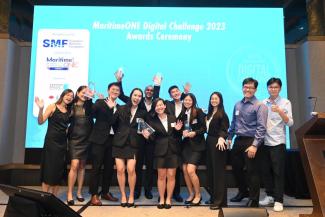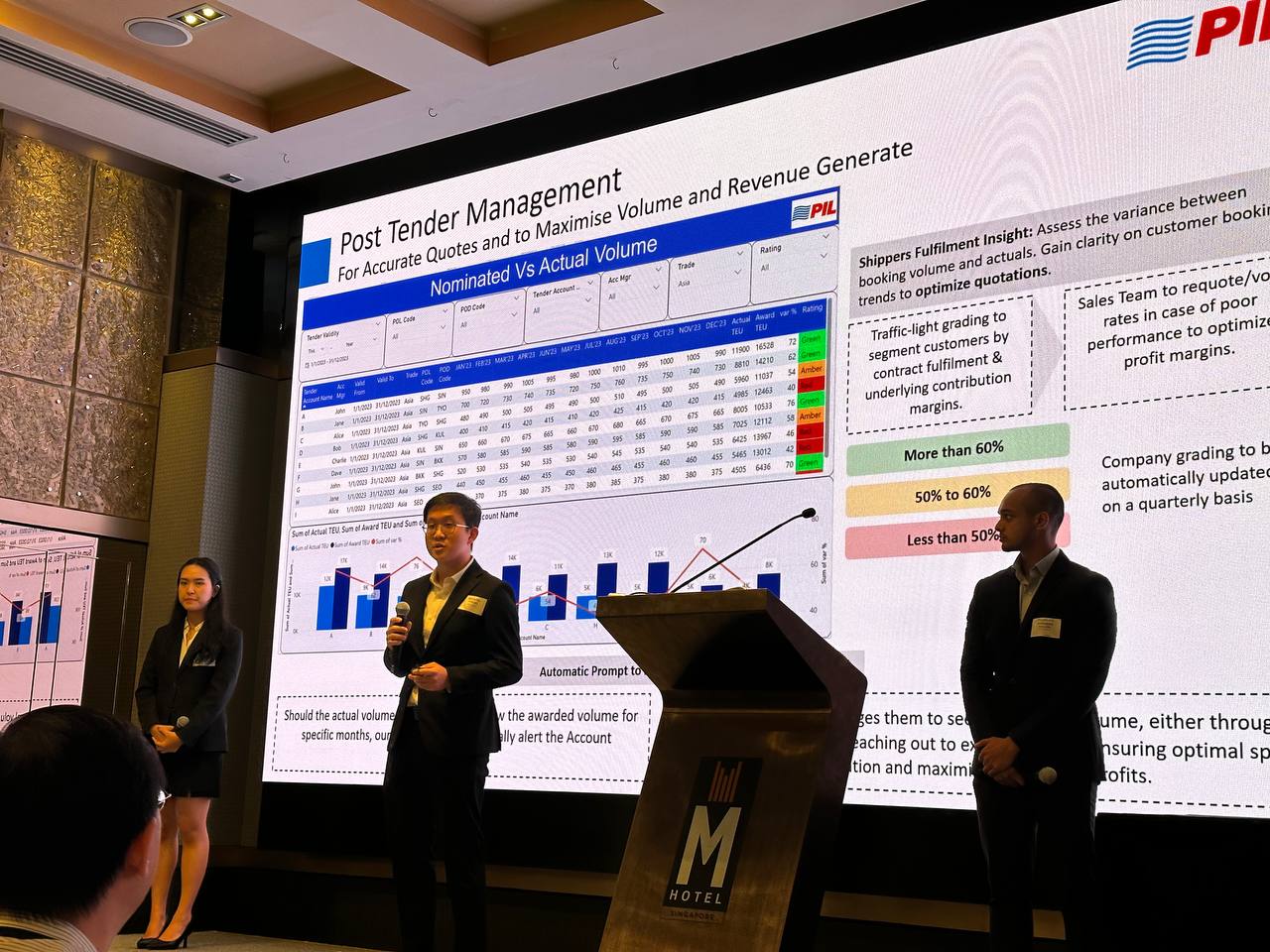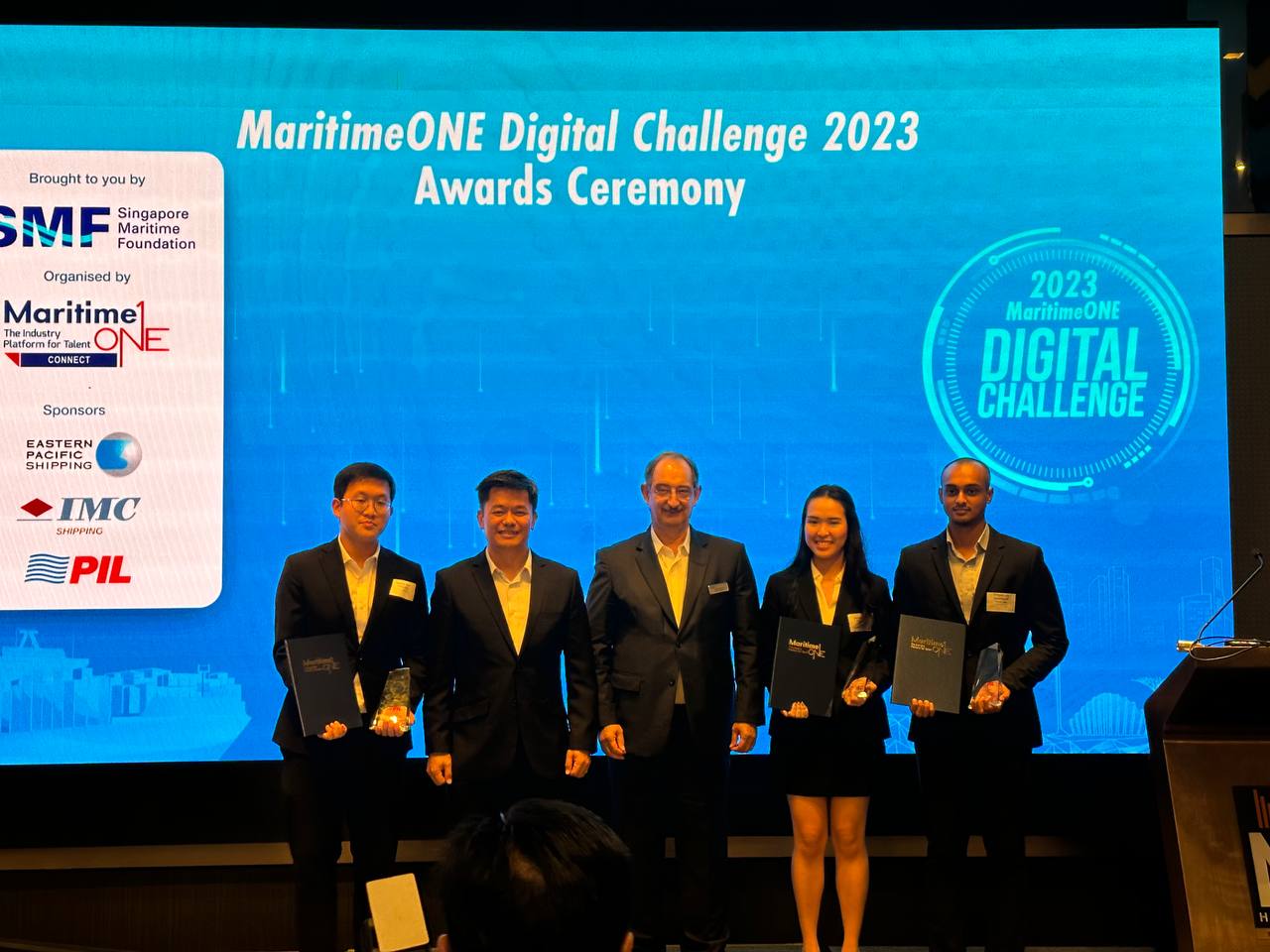
The SMU flag few high at the MaritimeONE Digital Challenge 2023 with three teams making it to the finals. Team NE and Team GRQ went on to clinch the championship title in two of three categories, while Team Halp received the Merit prize. Some of the team members hail from the Maritime Business and Operations track (MBOT) and International Trading track (ITT) offered at SMU Lee Kong Chian School of Business.
Organised by the Singapore Maritime Foundation (SMF) in collaboration with industry partners, the annual case competition invites students from Singapore’s universities and polytechnics to respond to challenge statements at the intersection of maritime and technology.
This year’s edition, which was sponsored by leading multinationals Eastern Pacific Shipping, IMC Shipping and Pacific International Lines (PIL), saw participation from 190 students across 60 teams.
Making it to the finals were 15 finalist teams, comprising students from a diverse range of disciplines including maritime studies, supply chain management, business, economics, computer science, and data analytics.
Eastern Pacific Shipping challenged the teams to devise novel concepts towards an emissions digital tool that would allow shipping organisations to visualise and compare vessel emissions across fleet and industry, forecast voyage emissions based on port-to-port data, account for various fuel types and obtain a measure of fuel selection cost.
On the other hand, PIL asked students to propose a digital smart tool for the liner shipping business that would streamline and optimise the entire tender process for customers — enhancing efficiency, transparency and cost-effectiveness while maintaining security and confidentiality.
SMU’s Team NE recognised that having an emissions dashboard as a tracking system would allow a company to know if it is on the right track for decarbonisation. With increasing regulatory efforts, the frequency and accuracy of emissions reporting must keep up, so that the industry has a concrete database to effectively support its decarbonisation efforts. With this in mind, the team, comprising Brandon Sia (Year 3, BBM, MBOT track), Celest Sim (Year 3, BSC(IS) and Rachael Wee (Year 3 BBM, MBOT track) proposed their solution: EPS Vessel Emission Tracker, or EVET for short. EVET tracks vessel emissions and fuel consumption across the fleet and between vessels, monitors the efficiency of vessel operations, and employs a machine learning model to forecast optimal routes by balancing voyage costs and emissions.
On the other hand, Team GRQ proposed to PIL an intelligent tendering system – a one-stop platform for both PIL and its customers to track, manage and analyse their tenders. Team GRQ comprised Aaron Ho (Year 4, BBM, MBOT track), Deepan Arumugam (Year 4, BAcc, ITT track), and Joveen Yue (Year 4, BSc(Economics), ITT track).
On the stellar performance of the SMU teams, Joveen, team leader of Team GRQ, said, “The competition has given us the unique opportunity to engage with real companies, and to provide real solutions to real problems. This has offered us valuable insights into the liner business and allowed us to explore the potential of technology in transforming the maritime industry.” Aaron echoed her sentiments. “As a student, it was an eye-opening experience to engage directly with senior industry leaders. The networking opportunity allowed me to gain deep insights and ask questions. This has truly been a unique learning experience beyond the classroom!” he said.
Rachael from Team NE was grateful for the camaraderie from her teammates and support from LKCSB. “SMU’s tight-knitted community and the conducive environment for building connections across different schools had truly been a pivotal factor in our team’s accomplishments. We were hence able to keep abreast with both maritime knowledge and digital skills, to deliver a robust case to the judges,” she said.
Besides Team NE and Team GRQ, a third SMU Team, Halp, also made it to the finals and received the Merit Prize. Members comprise SCIS second-year undergraduates Philip Tan, Lucas Song, Pang Hyin Ki and Amrita Kokkeri.
- End -

